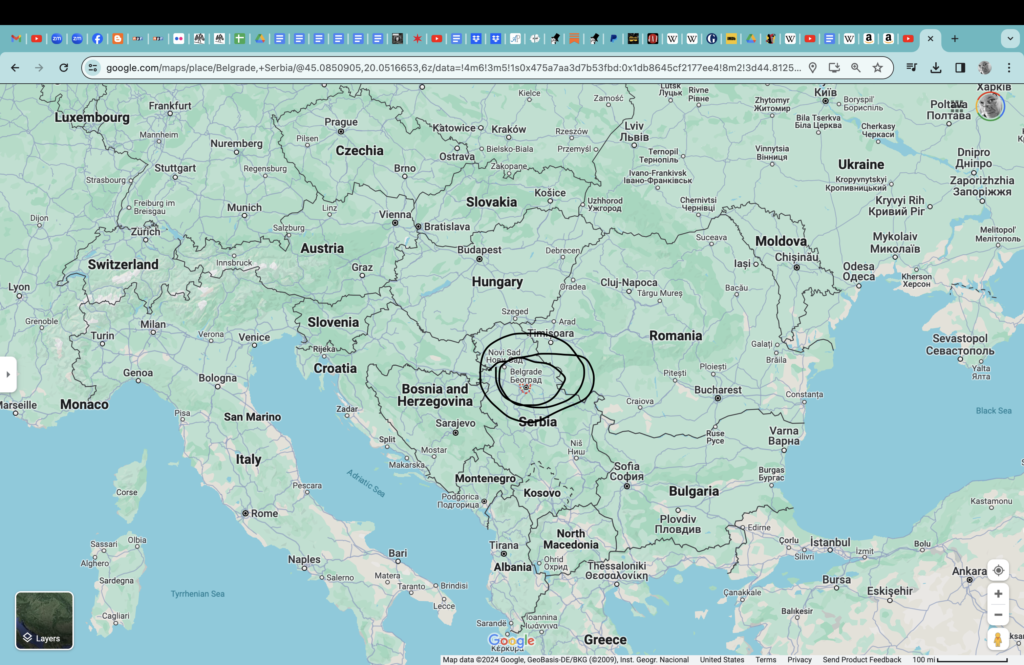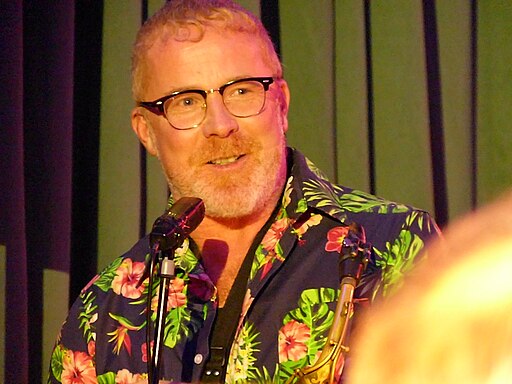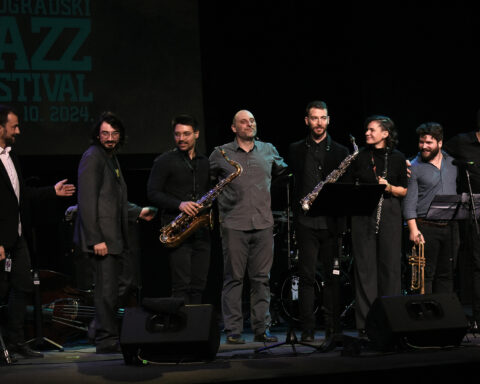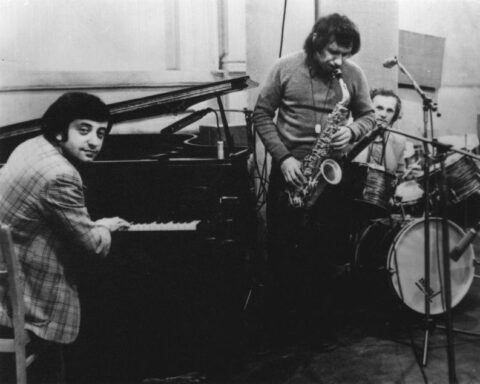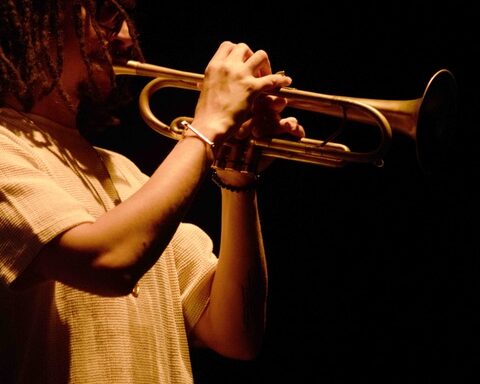Vid Jeraj , the JJA’s man in Serbia, talks with Hayden Chisholm, the genre-defying alto saxophonist and entrepreneur from Down Under, now based in Belgrade.
A genre-bending saxophonist, composer and multi-instrumentalist Hayden Chisholm was born in New Zealand and raised during multifarious cosmopolitan travels. Based since 2017 in Belgrade, Chisholm researches a-path-not-so-often-taken of ethno-fusions, namely ones related to gypsy and chamber music.
Having been a mainstay in Cologne for 20 years, in Belgrade Chisholm set out for entrepreneurship and opened up a music club called BAM, Balkan Academy of Music. With the choir PJEV (‘singing’ in Croatian) that consists of female singers from different Balkan regions added by an organist Kit Downes, Chisholm was reviewed by Ted Reichman in the New York Review of Books. Quartet Root 70, led by trombonist Nils Wogram for over 20 years, redefines post-free-jazz polyphony with Chisholm’s airy passages reminiscent of Lee Konitz against timbral and tonal exploration, also performing with strings. Chisolm engages in many distinctive projects
The conversation took place on a few sessions spanning from late autumn and early winter 2023, springing out only now for spring . . .
VJ: I understood that you settled in Belgrade few years ago, where you’ve been running a jazz club. How does the Serbian scene look like for a foreigner? Does the city have an infrastructure for jam sessions in the first place, since it’s known for its friendly atmosphere, and the night life?
HC: I did settle in Belgrade, six years ago. The Serbian scene for foreigners is a different kettle of fish from what I’m used to. But, yes it’s vibrant, there’s a lot of great musicians here and I made a point of checking out as much as I could, exploring what local talent has to offer. I’ve also helped some younger Serbian musicians come to Germany and vice versa, I booked quite a great German ban down here.
It’s got a good jazz scene, although I might say that folk scene is a bit stronger. There’s a wonderful brass band tradition in Serbia, as well as vocal tradition locally, besides the Roma culture which is very, very strong. Speaking about that lately, the city does not have a good infrastructure with the kind of jazz clubs that pop out of the ground like mushrooms and disappear, but there are regular jam sessions, and young musicians definitely take advantage of that.
And, yes, Belgrade is known for its friendly atmosphere, and the night life? Concerts are known to start a bit later, and generally live music is something that’s better appreciated here, which is something that suits me.
What do you do in Belgrade, actually, considering booking and playing? As one may notice, you are often in the wilderness, training rather than rehearsing.
Well, first of all, I – exist. I go to the ‘pijaca’, to the market and get a lot of good vegetables. It’s one of my favorite spots here. I usually cook myself. I am a father of two sons here, that keeps me pretty busy. And about a year and a half ago, I opened up a music club called BAM, Balkan Academy of Music, with a good friend of mine. We put on a pretty regular series of concerts — jazz, blues, also local Roma musicians, also with touring bands when they come through. That keeps us busy. And my goal was to make a space that really has world class sound. We work on the sound and the acoustics, we got a grand concert piano as a donation from the Goethe Institute [German cultural mission] to mount up a little place where musicians can feel good, and at home.
And yes, I spend a lot of time in the wilderness training. I’m an ultra-runner. So I go to mountains and train wherever I can. And that’s kind of a good balance for me for my bohemian jazz club life.
The recent political climate changed the city’s vibes to an extent that the living costs for a regular Jovan had quite escalated. Do you collaborate with the Russian expat circuit, too?
Yes, it’s true, the living costs have raised here quite significantly. As they have in many other parts of the world, rent in particular. That is in part due to the many Russian expats who moved here last year. I don’t think it has affected the quality of life on my part that much, because Serbs put so much emphasis on socializing and going out. I also heard that in the ’90s, during the very hard times, there was one thing they’ve never stopped doing, this coming together, an aspect of the culture that’s really important. Maybe especially in difficult times and that’s something that affected.
I haven’t really worked with Russian expats, there are some Russian and Ukrainian musicians coming through, playing in a club and you notice in the streets a little bit. From my time in Serbia now, the folk music makes sense to me, it’s easier for me to put everything in context. And for everything I make out of what comes my way, to transform it.
Now, next to Belgrade. You gave a workshop at Jazzinty festival in Slovenia last August. Then there is a project you had in Zagreb… So, how did you get involved with PJEV choir and which trajectories does one need to connect in order to make this project happen? Seems like a great project bridging the traditional choral music from all of those countries altogether.
I’m a curious person and upon coming down here, as commented on a first question, kind of set up to research as far as what I could. I found about this place, its cultures and its music. And one of the traditions that I have encountered was a capella singing, here in Serbia, but also neighboring countries, including Croatia. So, I met some singers and collaborated with them, I joined them with my saxophone and my shruti box. We did a couple of test concerts in a small festival I put on here, called Dortjol festival.
I consider myself a song collector, someone always looking up for new material and ideas, and I found this tradition particularly moving with their harmonies and the way they sing together. And that grew over the years, we played a few things together and I had a chance to bring these girls to Cologne Jazz Week. For that particular concert, I invited an organist Kit Downes to join us. We managed to record the concert and we’ve released that on Red Hook Records.
It was a first take among Kit, the girls and me, we really did it in a free way, the first reaction, without planning so much because the music they sing itself is so strong that need no any accompaniment and whatsoever. We decided to just basically do what we can – in the moment. The results were very pleasing, and we’ll continue that way. It has its own kind of edge which is another layer of unexpected music happenings underneath or above, as of next to the music itself. And that’s what we’ll continue to feature. These girls by the way, are singing songs from the whole region, which is also interesting in itself. Songs that have been endangered in the way of dying out.
How did you get into research of intonations and micro-tonalities? For someone involved with avant-jazz, your tone is rather classical and airy… What has been a point of research that brought you to chamber music thinking?
So, there’s many little layers to unpack my interest in intonation… It started early with quartertones on saxophone that evolved into harmonics – an area of research where I got to meet up my wife – because I am mostly interested on different musical cultures which is something that often comes up. And saxophone is great for exploring that because you have so many options for intonation. As obviously, it has its ups and downs.
You could say that my tone is rather classical cause it is close to a sine wave, it has vibrato, it is airy, yes, as an aesthetic choice of mine. All these things make for a natural progression of my life as a musician, how my tone has developed through my life, of sound I like to make and do make it. To be honest with you, I think that the saxophone is often played in a way that’s narrow area of its own possibilities. And I’m talking about dynamics, intonation, tone colour and what not. You can simply pick it up and blow air into it, and make sound that is very easy to do. Or, you could do some other, let’s say more nuanced playing on it and that’s kind of style that I like to do. Also means I can play with quiet instruments and voices much easier, so that’s not only my personal aesthetic choice.
Originally from New Zealand, you’re familiar with the Japanese scene, but were living in Germany for a long time. I think someone once told me how the NZ’s expat rate is quite high. Why is it so? What was so interesting about Cologne to make it your mainstay?
NZ is a small place, but has many musicians spread across the world, who cut their teeth in far away places. I found Europe fascinating, because it is a great place with many cultures and different languages. I ended up in Cologne by chance, the only school after NZ I’ve been to. Germany is still good place for free-lancing, free-spirited musicians like myself. So, I stayed there for quite awhile. It is a good opportunity just to go there, there are all kinds of music cultures you can associate with.
Now, tell me about one of your longest-lasting projects, Root 70 pianoless quartet. Since I missed it at Vienna Porgy & Bess last autumn, I got to catch Nils Wogram with Bojan Z Quartet at Sarajevo jazz fest in autumn. I guess this project is a long story. Do you mind taking off down the memory lane?
We’ve been collaborating with Nils in that band since last 20 years in different formats with another drummer Matt Penman, who is also from NZ. And it is nice to have such a long beautiful relationship, over the years where we have been changing, developing, and bringing new ideas. Something, I cherish and I want to continue, as well.
Regards the genre thing in jazz, I was just wondering where is to look for the final frontier in music considering that the word ‘freedom’ that the jazz has been tackling itself with for such a long time went into direction of a certain stereotype.
It’s not something I think about and I’m not really sure if a “final frontier” in jazz exists. It’s like a kind of evolving beast, that is continually able to pick on influences and absorb all the kind of osmosis from the outside world. And go bring these to its organic body. I also don’t think about these bigger questions — I concentrate on my small world. But I don’t think there is gonna be a final frontier. I like to think in my own little world to all kinds of sounds from outside and that could be club sounds, musique concrete sounds, as far as your imagnation runs . . .
You can incorporate all those sounds into a music we call “jazz”; we could lose ourselves many days a week, trying to define what that is. I don’t think that matters! What matters in this music is that is open, to be in the moment, an improvisation that catapults of our music. And that means anything can happen at any time. In the moment, a day, a time, a year. Everything is completely open. There is no final frontier for me. I don’t worry too much for definitions or genres or namings . . . as long as the intention is true, I try to make something that personally for me, makes sense.

